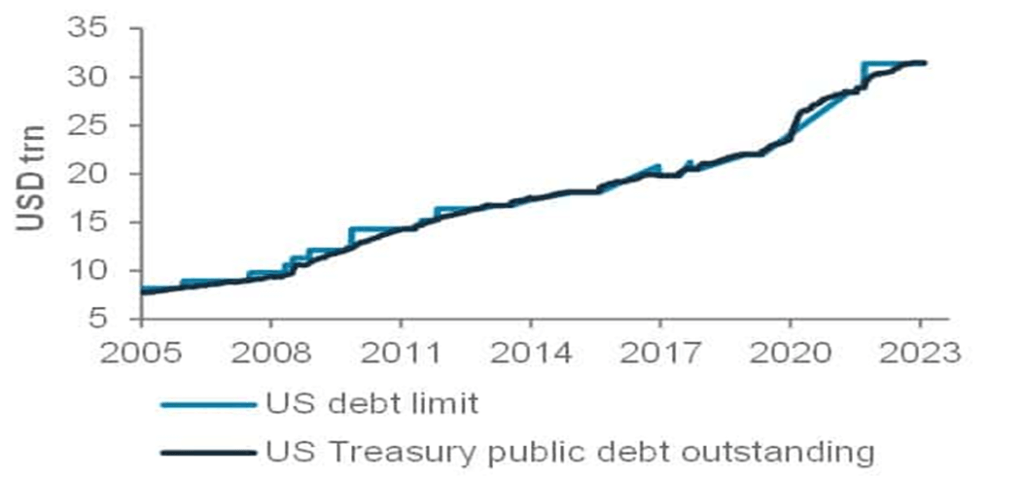The United States government is facing an unprecedented situation where it is on the verge of defaulting on its borrowing, which could have severe repercussions not only for America but also for economies around the world. The seriousness of this issue was highlighted by the American President’s cancellation of his recent visits to Australia and Papua New Guinea. In this essay, we will explore the potential consequences of a government default and examine the ongoing conflict between Republicans and Democrats. Furthermore, we will discuss possible ways to resolve the crisis and prevent further damage to the global economy.
Consequences of Government Default:
- Financial Strain on the US Government: If the US government defaults, it will no longer have sufficient funds to operate, leading to a significant reduction in its expenses. This can have detrimental effects on the functioning of essential services and public programs, impacting the American people.
- Economic Impact: A government default would trigger a series of economic consequences with far-reaching effects. Some potential outcomes include:
- Weakening of the Dollar: The value of the US dollar would likely decline, affecting international trade and investments.
- Stock Market Collapse: The uncertainty surrounding a government default could cause stock markets to plummet, leading to significant losses for investors.
- Job Losses: The economic turmoil resulting from a default could lead to widespread job losses, potentially affecting millions of individuals.
- Downgraded Credit Rating: A default would also result in a downgrade of the US credit rating. This would make it more expensive for the government to borrow in the future, further straining its financial position.
Global Repercussions:
The repercussions of a US government default would extend beyond American borders. The global interconnectedness of economies means that no corner of the world would remain unaffected. Some potential global consequences include:
- Economic Downturn: A US default could trigger a global economic downturn, impacting trade, investments, and overall economic growth.
- Financial Instability: Global financial markets would experience increased volatility, potentially leading to instability in banking systems.
- Trade Disruptions: The disruption caused by the default could disrupt international trade flows, affecting businesses and industries worldwide.

The Republican vs. Democrats Tussle:
The ongoing conflict between Republicans and Democrats has further complicated the resolution of the debt ceiling issue. Their differing ideologies and priorities have hindered a swift resolution. Key points of contention include:
- Fiscal Conservatism vs. Social Welfare: Republicans are ideologically fiscal conservatives, advocating for limited government spending. On the other hand, Democrats believe in investing more in social welfare programs and public services.
- Spending Levels: Democrats argue for maintaining spending at 2023 levels, while Republicans demand that spending be kept at 2022 levels in the next fiscal year.
- Revenue Generation: President Biden has proposed taxing the wealthy more and closing tax loopholes for industries like oil and pharmaceuticals to generate additional revenue.
Possible Solutions:
To avoid a government default and address the ongoing crisis, it is crucial to explore viable solutions. One potential way out is to learn from the past:
- Drawing from the 2011 Example: In 2011, a similar debt ceiling crisis was resolved through a compromise that involved significant spending cuts worth over $900 billion. A similar bipartisan agreement could be pursued in the current situation.
Reforming the Debt Limit Process: Many experts argue that the current debt limit process is ineffective and does not promote fiscal responsibility. Exploring alternatives to the debt ceiling, such as implementing automatic increases tied to economic indicators, could provide a more stable framework.
Important Points:
- Consequences of Government Default:
- Financial strain on the US government 💰
- Economic impact:
- Weakening of the Dollar 📉
- Stock market collapse 📈
- Job losses 👨💼👩💼
- Downgraded credit rating 📉
- Global Repercussions:
- Economic downturn worldwide 🌍📉
- Financial instability 🏦💥
- Trade disruptions 🌐🚫
- Republican vs. Democrats Tussle:
- Ideological differences:
- Republicans: Fiscal conservatives 💼
- Democrats: Advocates for social welfare 🌍🤝
- Disagreements on spending levels:
- Democrats: Maintain spending at 2023 levels 📈
- Republicans: Keep spending at 2022 levels 📉
- Revenue generation proposals:
- Biden: Taxing the rich more and closing tax loopholes for oil and pharmaceutical industries 💰💊🛢️
- Ideological differences:
- Possible Solutions:
- Learning from the 2011 example:
- Bipartisan compromise involving significant spending cuts 💼💰💪
- Reforming the debt limit process:
- Alternatives to the debt ceiling, such as automatic increases tied to economic indicators 🔄
- Learning from the 2011 example:
Why In News
In an unprecedented and alarming situation, the US government’s impending default on its borrowing looms as a dire threat, with the potential to trigger severe economic repercussions worldwide. The global financial stability hangs in the balance, as the ramifications of such a default could send shockwaves through interconnected markets, causing widespread disruptions and uncertainty.
MCQs about Impending US Government Default
-
What could be a potential consequence of a US government default?
A. Weakening of the Dollar
B. Economic growth and stability
C. Job losses and unemployment
D. Lower borrowing costs for the government
-
How might a US government default impact global economies?
A. Increased international trade opportunities
B. Enhanced financial stability worldwide
C. Economic growth in other countries
D. Global economic downturn and trade disruptions
-
What is the main ideological difference between Republicans and Democrats regarding government spending?
A. Both advocate for limited government spending
B. Republicans prioritize social welfare programs
C. Democrats emphasize fiscal conservatism
D. Republicans believe in investing more in social welfare schemes
-
What is one possible solution to address the US government default crisis?
A. Increasing the debt limit without any conditions
B. Implementing automatic increases in the debt ceiling
C. Reducing spending on social welfare programs
D. Eliminating taxes for the wealthy
Boost up your confidence by appearing our Weekly Current Affairs Multiple Choice Questions
![]()


